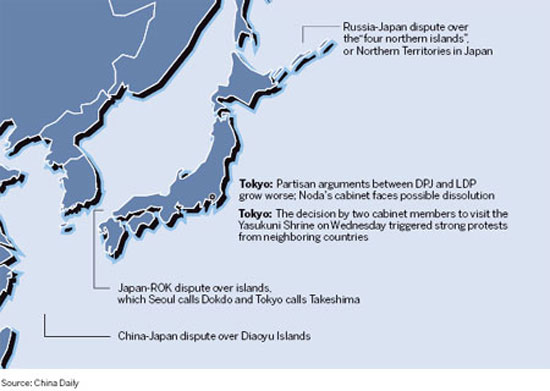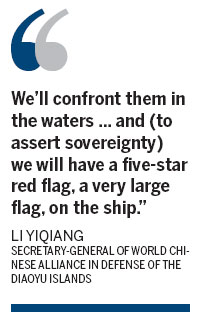Japan's political problems adding up
Updated: 2012-08-15 07:52
By Li Xiaokun and Zhang Yunbi (China Daily)
|
||||||||
Noda must decide how to respond to rising tensions in E. China Sea
Japan's troubled Noda administration is facing several political headaches on Wednesday, as tensions rise in the East China Sea and the historically sensitive anniversary of Japan's World War II surrender stirs tensions.
The Japanese government must decide how they will respond to a Chinese vessel that is seeking to assert sovereignty over the Diaoyu Islands, and figure out how to deal with two Japanese cabinet members who have vowed to visit the Yasukuni Shrine.
Experts say the two events will not only add fuel to Yoshihiko Noda's diplomatic crisis, which has seen Tokyo recalling its ambassador to Seoul, but will also have a subtle impact over geopolitics in Northeast Asia given Japan's escalating territorial disputes with China, Republic of Korea and Russia.
|
 |
Island protest
A vessel carrying 14 activists seeking to assert Chinese sovereignty over the Diaoyu Islands, left Hong Kong on Sunday and entered waters off Taiwan on Tuesday.
The vessel is scheduled to replenish supplies in Taiwan and arrive at waters off the Diaoyu Islands on Wednesday.
Awaiting them will be Japan's Coast Guard, which Japan's Fuji TV said is prepared for the potential confrontation.
Japan's Sankei Shimbun reported on Monday that Japan's Maritime Self Defense Force will send warships if the Coast Guard fails to stop the Hong Kong activists from stepping on the islands.
|
 |
Li Yiqiang, secretary-general of World Chinese Alliance in Defense of the Diaoyu Islands, told media that the crew of the Hong Kong ship is unlikely to step on the islands given the presence of Japan's Coast Guard.
"But we'll confront them in the waters ... and (to assert sovereignty) we will have a five-star red flag, a very large flag, on the ship," he said, referring to China's national flag.
Tensions have flared between Beijing and Tokyo since outspoken right-wing Tokyo Governor Shintaro Ishihara in April released his plan to "purchase" the islands.
In early July, Japanese Prime Minister Yoshihiko Noda announced a plan to "nationalize" the islands, escalating the situation and prompting Beijing to lodge solemn representations.
Also in July, a Taiwan ship asserted Chinese sovereignty over the islands and threw a Chinese national flag in waters several meters off the islands after a confrontation with the Japanese Coast Guard.
Chen Miau-tak, chairman of the Hong Kong Diaoyu Islands Protection Task Force, said the smooth departure of the Hong Kong vessel reflected "supportive attitude" of the new Hong Kong government over activities defending the Diaoyu Islands.
Hong Kong, which has deep economic relations with Japan, banned such activities since 2009. The last time Hong Kong vessels entered waters off the Diaoyu Islands was in 2006.
The departure of the Chinese activists came just days after ROK President Lee Myung-bak on Aug 10 visited the disputed islands, which Seoul calls Dokdo and Japan calls Takeshima. Japan immediately recalled its ambassador to the ROK.
In July Russian Prime Minister Dmitry Medvedev visited Kunashiri Island, one of the Russian-held islands also claimed by Japan, triggering a strong response from Tokyo.
Zhou Yongsheng, an expert at China Foreign Affairs University, said Japan's actions on the islands issue are likely to estrange Taiwan further from the US-Japan alliance.
"It was defending the Diaoyu Islands 40 years ago that strengthened the political bond between the mainland and Taiwan," he said.
Shrine visit
China-Japan ties may be further strained on Wednesday by two Japanese politicians' possible visit to the Yasukuni Shrine, a move that analysts say will embarrass Noda.
Two ministerial officials from the ruling Democratic Party of Japan on Aug 10 said they will visit the Shrine "as citizens" in Tokyo on Wednesday.
The Shrine honors Japan's war dead, including 14 Class-A World War II war criminals, and is viewed as a symbol of Japan's past militarism and its history of invading other countries.
The Japanese politicians' visit to the Shrine has been viewed as an affront to China and ROK.
The two senior officials' visit, if made, would mark the first visit by the ruling DPJ's cabinet members, and Noda has reiterated the ban on his cabinet members' visiting the shrine.
The ROK Foreign Ministry on Tuesday slammed the planned visit and said Seoul "holds strongly to a position that Japanese authorities including cabinet ministers must not pay respects at the Yasukuni Shrine".
Chinesel newspaper People's Daily on Tuesday warned in a commentary that "Aug 15 is not the day for some Japanese politicians to play petty tricks", and the so-called visit as a citizen makes no difference to their intention to distort history.
Tokyo on Monday rejected another application by some Japanese congress members to land on the Diaoyu Islands to "commemorate the deaths of war".
Yet the organizers on Tuesday claimed that the trip to the islands will be made on Sunday with around 150 participants, including nine Congress members, Asahi Television reported.
Contact the writers at lixiaokun@chinadaily.com.cn and zhangyunbi@chinadaily.com.cn

 Relief reaches isolated village
Relief reaches isolated village
 Rainfall poses new threats to quake-hit region
Rainfall poses new threats to quake-hit region
 Funerals begin for Boston bombing victims
Funerals begin for Boston bombing victims
 Quake takeaway from China's Air Force
Quake takeaway from China's Air Force
 Obama celebrates young inventors at science fair
Obama celebrates young inventors at science fair
 Earth Day marked around the world
Earth Day marked around the world
 Volunteer team helping students find sense of normalcy
Volunteer team helping students find sense of normalcy
 Ethnic groups quick to join rescue efforts
Ethnic groups quick to join rescue efforts
Most Viewed
Editor's Picks

|

|

|

|

|

|
Today's Top News
Health new priority for quake zone
Xi meets US top military officer
Japan's boats driven out of Diaoyu
China mulls online shopping legislation
Bird flu death toll rises to 22
Putin appoints new ambassador to China
Japanese ships blocked from Diaoyu Islands
Inspired by Guan, more Chinese pick up golf
US Weekly

|

|






